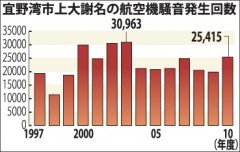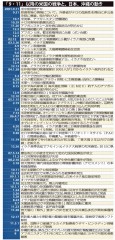U.S. Marine Corp has intensified its training in Okinawa in preparation for combat

The number of occurrences of aircraft noise at Ue Ojana district, Ginowan City.
September 10, 2011 Ryukyu Shimpo
Ten years have passed since the September 11 2001 terrorist attacks on the United States. Taking the lead in the war against the terrorism, the United States plunged itself into war in Iraq and Afghanistan, sending units to the battle areas from their bases in Okinawa. During this time, in preparation for combat in the Middle East, the Marine Corps has intensified its training of its personnel in Okinawa, and this has led to accidents and incidents involving the military, including when a helicopter due to be deployed in Iraq crashed onto Okinawa International University. Okinawa has clearly been affected by the war in the Middle East. In this article, we take a look at what has been changed by 9/11 on this military island and what the prospects are for the future.

Movements in Okinawa and Japan since the September 11 terrorist attacks on the United States. (click to enlarge)
Since 9/11, the number of flights from other bases to Futenma Air Station has increased, and as a result, the level of noise pollution in the residential area around the air station has become worse. In 2002 and 2003, in the Ue Ojana district, Ginowan City, aviation noise lasting more than five seconds at least 70db was recorded 30000 times. This figure is more than 1.5 times the number for an average year in the same area. The increased level of training has also led to more accidents and emergency landings of aircraft, with ten cases officially announced for the period from 2001 to 2003.
The number of airplanes assigned to Futenma has gone down from 71 to 52 since the outbreak of war in Iraq. The number of CH-46 helicopters is unchanged, and the number of CH-53E, AH-1 and UH-1 helicopters has been drastically reduced, but the issue of noise pollution is yet to improve with over 25000 occurrences of aviation noise recorded at Ue Ojana last year. The Base Affairs Policy Division of Ginowan City speculates that repeated takeoffs and landings of a small number of aircraft is the cause of the noise pollution, despite the reduced number of aircraft. A group of five helicopters were confirmed as having flown over the residential area to the north of the runway in May of this year.
Shigeo Yamauchi, the head of the Base Affairs Policy Division of Ginowan City, said, “We residents have been viewed as an unimportant part of the equation by the United States and those running its military operations. Japanese government officials have not complained to them, and the U.S. military interprets this as meaning that they are allowed to do anything they like.” He also stated, “The U.S. military has failed to observe standard operating procedure or the accepted rules, such as noise control measures, environmental principles and traffic patterns for their flights. The Japanese government should ascertain the details of the movement of U.S. forces and point out the problems to them.”
(English Translation by T&CT, Mark Ealey)
Previous Article:Mid-Autumn Celebration held at Shurijo Castle Park
Next Article:Okinawan fishermen terrified to have guns pointed toward them by U.S. warships near White Beach
[Similar Articles]
- Ginowan Mayor’s sit-in-protest against the Osprey deployment
- Complaints from local residents after six CH 46 helicopters fly over Ginowan City
- Ospreys eight times louder than the CH-53 helicopter
- MCAS Futenma helicopter’s blade tape falls on Uranishi Junior High, raising concerns about Marine Corps aircraft maintenance
- U.S. military nighttime takeoffs/landings violate noise-prevention agreement, citizens complain
 Webcam(Kokusai Street)
Webcam(Kokusai Street)


